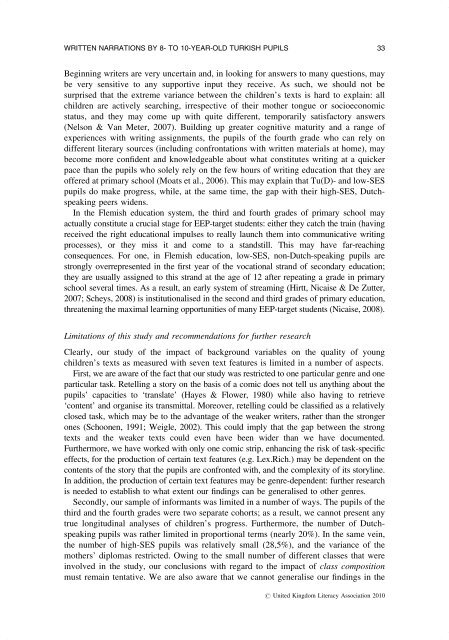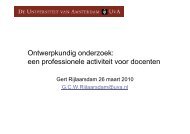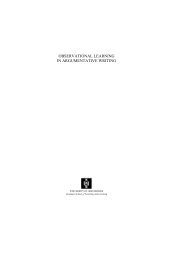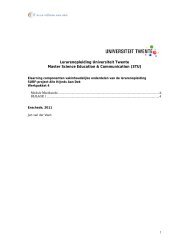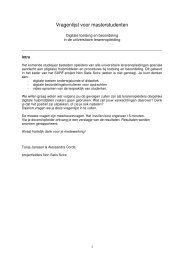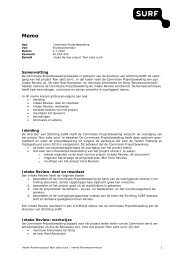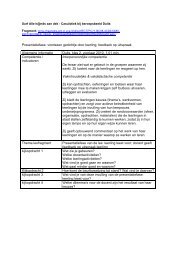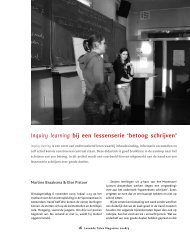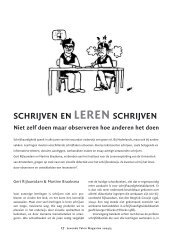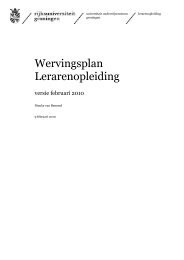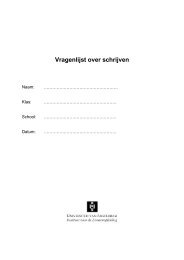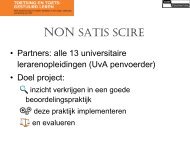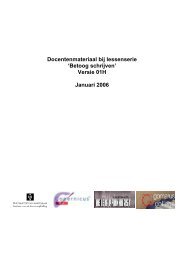to 10-year-old Turkish pupils in Flemish primary education
to 10-year-old Turkish pupils in Flemish primary education
to 10-year-old Turkish pupils in Flemish primary education
You also want an ePaper? Increase the reach of your titles
YUMPU automatically turns print PDFs into web optimized ePapers that Google loves.
WRITTEN NARRATIONS BY 8- TO <strong>10</strong>-YEAR-OLD TURKISH PUPILS 33<br />
Beg<strong>in</strong>n<strong>in</strong>g writers are very uncerta<strong>in</strong> and, <strong>in</strong> look<strong>in</strong>g for answers <strong>to</strong> many questions, may<br />
be very sensitive <strong>to</strong> any supportive <strong>in</strong>put they receive. As such, we should not be<br />
surprised that the extreme variance between the children’s texts is hard <strong>to</strong> expla<strong>in</strong>: all<br />
children are actively search<strong>in</strong>g, irrespective of their mother <strong>to</strong>ngue or socioeconomic<br />
status, and they may come up with quite different, temporarily satisfac<strong>to</strong>ry answers<br />
(Nelson & Van Meter, 2007). Build<strong>in</strong>g up greater cognitive maturity and a range of<br />
experiences with writ<strong>in</strong>g assignments, the <strong>pupils</strong> of the fourth grade who can rely on<br />
different literary sources (<strong>in</strong>clud<strong>in</strong>g confrontations with written materials at home), may<br />
become more confident and knowledgeable about what constitutes writ<strong>in</strong>g at a quicker<br />
pace than the <strong>pupils</strong> who solely rely on the few hours of writ<strong>in</strong>g <strong>education</strong> that they are<br />
offered at <strong>primary</strong> school (Moats et al., 2006). This may expla<strong>in</strong> that Tu(D)- and low-SES<br />
<strong>pupils</strong> do make progress, while, at the same time, the gap with their high-SES, Dutchspeak<strong>in</strong>g<br />
peers widens.<br />
In the <strong>Flemish</strong> <strong>education</strong> system, the third and fourth grades of <strong>primary</strong> school may<br />
actually constitute a crucial stage for EEP-target students: either they catch the tra<strong>in</strong> (hav<strong>in</strong>g<br />
received the right <strong>education</strong>al impulses <strong>to</strong> really launch them <strong>in</strong><strong>to</strong> communicative writ<strong>in</strong>g<br />
processes), or they miss it and come <strong>to</strong> a standstill. This may have far-reach<strong>in</strong>g<br />
consequences. For one, <strong>in</strong> <strong>Flemish</strong> <strong>education</strong>, low-SES, non-Dutch-speak<strong>in</strong>g <strong>pupils</strong> are<br />
strongly overrepresented <strong>in</strong> the first <strong>year</strong> of the vocational strand of secondary <strong>education</strong>;<br />
they are usually assigned <strong>to</strong> this strand at the age of 12 after repeat<strong>in</strong>g a grade <strong>in</strong> <strong>primary</strong><br />
school several times. As a result, an early system of stream<strong>in</strong>g (Hirtt, Nicaise & De Zutter,<br />
2007; Scheys, 2008) is <strong>in</strong>stitutionalised <strong>in</strong> the second and third grades of <strong>primary</strong> <strong>education</strong>,<br />
threaten<strong>in</strong>g the maximal learn<strong>in</strong>g opportunities of many EEP-target students (Nicaise, 2008).<br />
Limitations of this study and recommendations for further research<br />
Clearly, our study of the impact of background variables on the quality of young<br />
children’s texts as measured with seven text features is limited <strong>in</strong> a number of aspects.<br />
First, we are aware of the fact that our study was restricted <strong>to</strong> one particular genre and one<br />
particular task. Retell<strong>in</strong>g a s<strong>to</strong>ry on the basis of a comic does not tell us anyth<strong>in</strong>g about the<br />
<strong>pupils</strong>’ capacities <strong>to</strong> ‘translate’ (Hayes & Flower, 1980) while also hav<strong>in</strong>g <strong>to</strong> retrieve<br />
‘content’ and organise its transmittal. Moreover, retell<strong>in</strong>g could be classified as a relatively<br />
closed task, which may be <strong>to</strong> the advantage of the weaker writers, rather than the stronger<br />
ones (Schoonen, 1991; Weigle, 2002). This could imply that the gap between the strong<br />
texts and the weaker texts could even have been wider than we have documented.<br />
Furthermore, we have worked with only one comic strip, enhanc<strong>in</strong>g the risk of task-specific<br />
effects, for the production of certa<strong>in</strong> text features (e.g. Lex.Rich.) may be dependent on the<br />
contents of the s<strong>to</strong>ry that the <strong>pupils</strong> are confronted with, and the complexity of its s<strong>to</strong>ryl<strong>in</strong>e.<br />
In addition, the production of certa<strong>in</strong> text features may be genre-dependent: further research<br />
is needed <strong>to</strong> establish <strong>to</strong> what extent our f<strong>in</strong>d<strong>in</strong>gs can be generalised <strong>to</strong> other genres.<br />
Secondly, our sample of <strong>in</strong>formants was limited <strong>in</strong> a number of ways. The <strong>pupils</strong> of the<br />
third and the fourth grades were two separate cohorts; as a result, we cannot present any<br />
true longitud<strong>in</strong>al analyses of children’s progress. Furthermore, the number of Dutchspeak<strong>in</strong>g<br />
<strong>pupils</strong> was rather limited <strong>in</strong> proportional terms (nearly 20%). In the same ve<strong>in</strong>,<br />
the number of high-SES <strong>pupils</strong> was relatively small (28,5%), and the variance of the<br />
mothers’ diplomas restricted. Ow<strong>in</strong>g <strong>to</strong> the small number of different classes that were<br />
<strong>in</strong>volved <strong>in</strong> the study, our conclusions with regard <strong>to</strong> the impact of class composition<br />
must rema<strong>in</strong> tentative. We are also aware that we cannot generalise our f<strong>in</strong>d<strong>in</strong>gs <strong>in</strong> the<br />
r United K<strong>in</strong>gdom Literacy Association 20<strong>10</strong>


